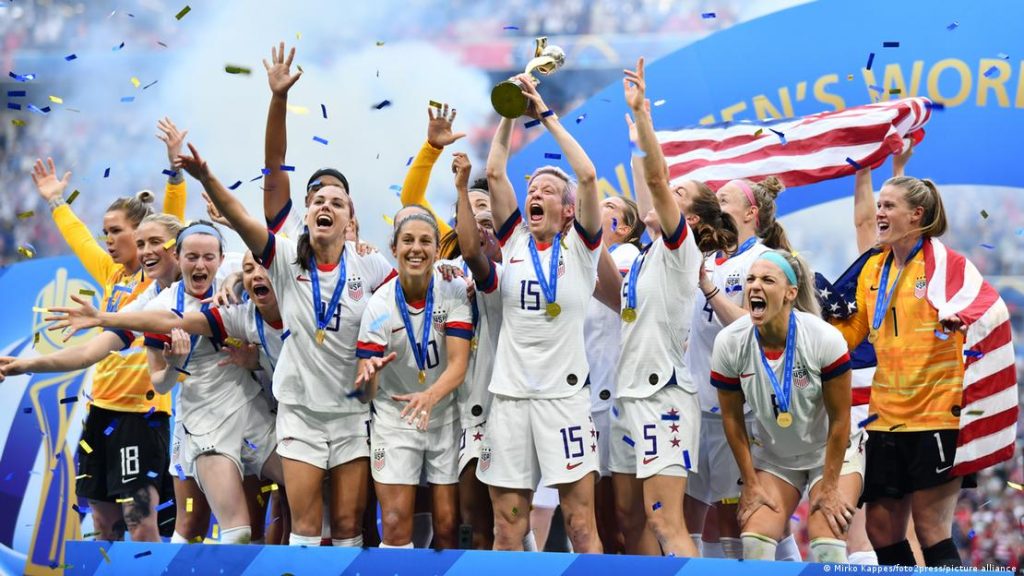
A record total of 32 teams will be reaching for the World Cup in Australia and New Zealand – Image: Friso Gentsch/dpa/picture alliance
How many teams are involved?
For the first time in its history, 32 teams — including eight debutants — are taking part in the Women’s World Cup. In 2019, the FIFA Council voted unanimously to approve President Gianni Infantino’s proposal to expand the number of participants from the 24 at the previous World Cup in France to 32.
While some may argue that expanding such tournaments may dilute quality, in a statement announcing the increase, Infantino pointed to the success of the 2019 event and sold the move as a “concrete step” to “foster the growth of women’s football.”
The FIFA president also announced that the prize pool has been increased by 300% to $150 million (€134 million). While the Women’s World Cup prize money is now three times the 2019 figure and 10 times that of 2015, prior to when Infantino became FIFA president, it is still considerably lower than the $440 million total prize money awarded at the men’s World Cup in Qatar last year.
Where are the matches being played?
Not only is this the biggest Women’s World Cup, but it is also the first to be co-hosted by two separate nations. The matches are to be played in 10 stadiums in nine cities. Six of the stadiums are in Australia, including two in Sydney, while the other four are in New Zealand.
New Zealand get the honor of playing the tournament’s opener when they kick off their campaign against Norway in Auckland’s Eden Park — three hours before the Matildas. The biggest is Stadium Australia with a capacity of 83,500, so it should come as no surprise that it will host both Australia’s opening match against Ireland and the final. The smallest is Adelaide’s Hindmarsh Stadium, with a capacity of 18,435.
With the tournament being played on the other side of the world, the matches won’t generally be in prime-time television viewing for either Europeans or Americans.

The Americans are going for their third-straight and fifth overall World Cup title – Image: Mirko Kappes/foto2press/picture alliance
Who are the favorites?
The United States are the clear favorites. Not only are they (as usual) top of FIFA’s women’s rankings, but they are the two-time defending champions, having won their fourth World Cup in France four years ago. However, there are question marks surrounding a new-look team due to the retirement of Carli Lloyd and the fact several key players have been ruled out with injury.
England’s Lionesses are also among the favorites, coming in as European champions after winning only the country’s second major international tournament after the men’s World Cup triumph all the way back in 1966. Although this time they won’t be playing in front of their home fans, the Lionesses appeared confident when speaking to DW at their Sunshine Coast base.
Despite some patchy pre-tournament form, Germany slot in slightly behind the England side they lost to in extra time of the final at last summer’s EUROs. The tragic hero of that drama was German star striker Alexandra Popp, but the question remains whether she can stay fit enough to recreate her record-breaking goal scoring form from last summer.

Alexandra Popp is likely to be key to Germany’s success in Australia – Image: Eibner/Memmler/picture alliance
Spain too have to be in the mix, despite last year’s turmoil when 15 players declared themselves unavailable due to a long list of grievances, including the leadership of coach Jorge Vilda. The Spanish FA, though, has backed him to lead a team including three “protesters” into the World Cup. Spain are missing some key players, but have two-time Ballon d’Or winner Alexia Putellas back after she missed the EUROs through injury.
The dark horses may be the Canadians, who traveled Down Under as the reigning Olympic gold medalists. But their build-up to this tournament was disrupted when the players threatened to strike over pay, before climbing down after a counterthreat from Canada Soccer. They still have one of the all-time greats in Christine Sinclair in their ranks — but Janine Beckie, forced out by a knee injury, will be sorely missed.
One last dance for veteran superstars
Canada’s Sinclair, leads the group of veterans who will almost certainly be playing in their last World Cup. The Canadian attacker, who has just turned 40, is international football’s all-time leading scorer among women or men, with 190 goals in 323 games. has appeared in five World Cups and four Olympic tournaments — leading the Canucks to that gold medal in Tokyo.

The USA superstar Megan Rapinoe is hoping to bow out with yet another World Cup title – Image: Andrea Vilchez/ZUMAPRESS.com/picture alliance
American superstar Megan Rapinoe, who just turned 38, announced in the days leading up to the World Cup that this would be her last. Her list of accomplishments is long, having won the last two World Cups with the USA, as well as a gold medal at the 2012 London Olympic Games.
At the age of 37, Marta Vieira da Silva — commonly referred to as simply “Marta” — will also likely be taking the pitch for her last World Cup. If it is her last, it will be a bitter loss for Brazil fans — Marta is the country’s top scorer with 115 goals in 174 games. (DW/NN-19-07-23)





